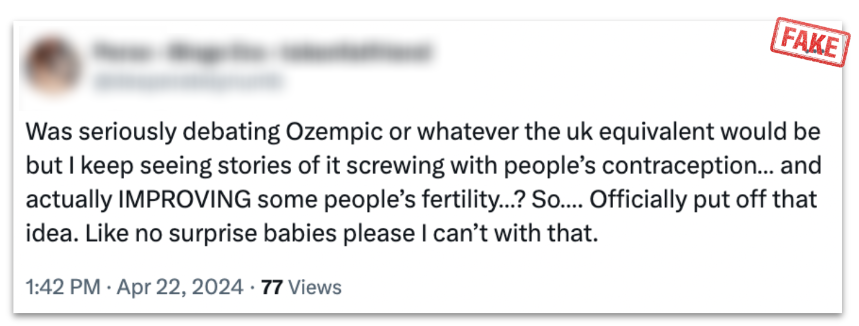Cyabra’s latest investigation into online discussions surrounding prescription medication Ozempic has revealed a concerning rise of disinformation propagated by fake profiles across various social media platforms. Dis- and misinformation campaigns aiming to distort public perception with negative narratives about the medication have potentially influenced millions using unfounded claims.
TL;DR?
- Negative content created by fake accounts had the potential to reach 5.9 million views on X and over 11 million views on Facebook, Instagram, and TikTok
- 21% of profiles discussing Ozempic on X were fake
- Numerous authentic X and Facebook accounts were illegally selling Ozempic
Ozempic Faces Fake Smear
From alleging severe side effects to spreading rumors about celebrity endorsements, fake profiles have strategically infiltrated discussions about Ozempic, amplifying fear, dis- and misinformation.

Cyabra discovered that 21% of the profiles discussing Ozempic on X over the past month were fake. The 503 posts and comments created by these fake accounts received over 3,700 engagements and had the potential to reach an audience of over 5.9 million views.
In addition to X, Cyabra analyzed 7,228 posts and comments across Facebook, Instagram, and TikTok. On those platforms, negative content about the medicine received over 800,000 engagements and had the potential to reach over 11 million views.
Most of these posts promoted a common narrative about various side effects of the medicine:
- Ozempic Face: People who take the drug experience changes in the shape of their face
- Ozempic Personality: After taking the medicine, users may experience mood changes, leading to anxiety
- Health Damage: The drug can cause organ dysfunction and may be life-threatening
What Is the “Ozempic Face”? (And Who Has It?)

A predominant narrative pushed by these fake profiles revolves around the term “Ozempic face”, claiming that the drug alters the facial appearances of those using it. This narrative alone saw 1,300 overall engagements and potentially reached over 354,000 views, exploiting fears and spreading unsubstantiated claims.
Many fake profiles criticized Hollywood’s use of Ozempic. Multiple profiles shared articles such as “Plastic Surgeons Warn About Prevalence of ‘Ozempic Face’ in Hollywood”, warning about “Ozempic face” among celebrities. Fake profiles spreading those narratives generated 2,100 overall engagements and over 2.3 million potential views, adding credibility to false narratives.

Who Pays More for Ozempic?
Moreover, Cyabra uncovered a significant backlash against manufacturer Novo Nordisk regarding Ozempic’s pricing strategies, claiming that prices of their medicine in the U.S are significantly higher compared to those in Europe. These posts portraying the company in a negative light reached a potential audience of 11.9 million.
The Illegal Ozempic Sales Industry
Beyond mis- and disinformation, Cyabra also identified authentic profiles offering unauthorized sales of Ozempic on X and Facebook, with links to Telegram for transactions. This sales campaign underscored the need for vigilant monitoring and response by the Ozempic team, as well as other pharmaceutical companies’ teams.
Combatting Mis- and Disinformation
The prevalence of fake profiles in discussions about Ozempic, and the impact of disinformation campaigns surrounding the medicine, highlights a critical threat posed by dis- and misinformation. Fake profiles manipulate social media discourse, disseminate false narratives, and significantly influence public perception.
For stakeholders managing the online reputation of pharmaceuticals like Ozempic, effective strategies for safeguarding public discourse include:
- Monitoring online conversations for fake campaigns and profiles spreading dis- and misinformation
- Identifying illegal sales and uncovering suspicious links, to not only safeguard public discourse but also ensure compliance and consumer safety
- Establishing ongoing monitoring systems to detect and respond promptly to new instances of fake accounts and disinformation campaigns
This underscores the urgent need for robust early detection strategies to combat fake profiles and misinformation online. For comprehensive solutions to identify illegal sales in real-time, and combat the risks posed by fake profiles and fake campaigns, contact Cyabra.


